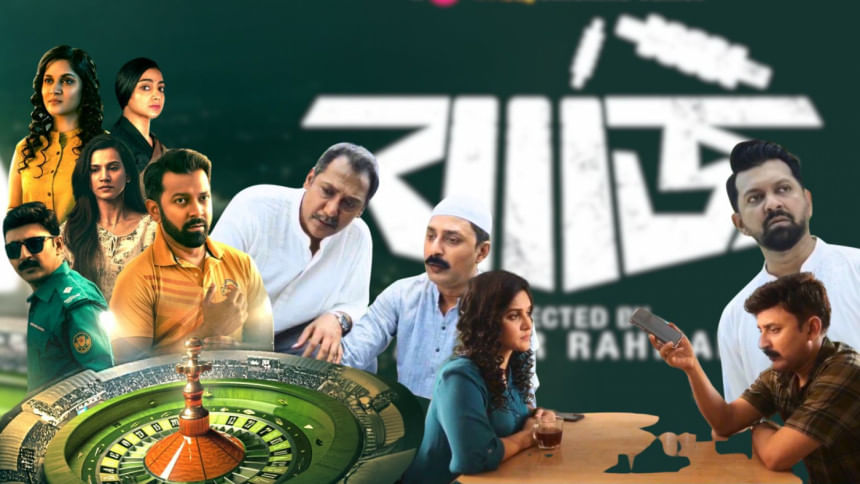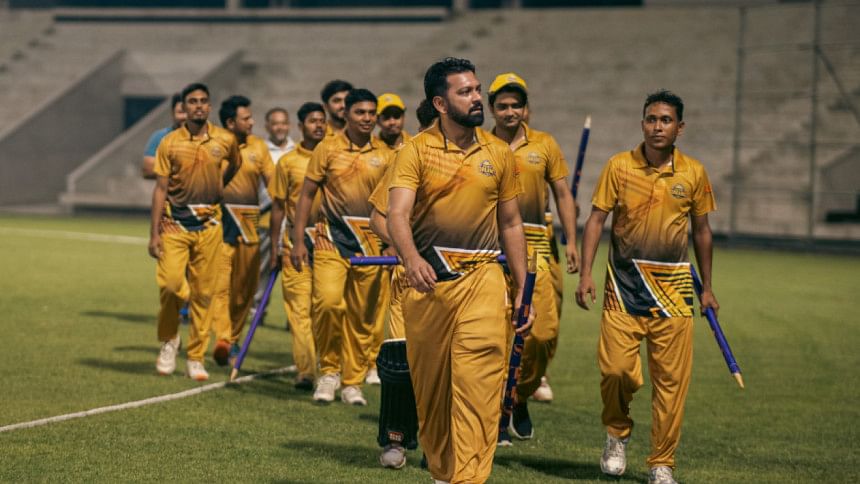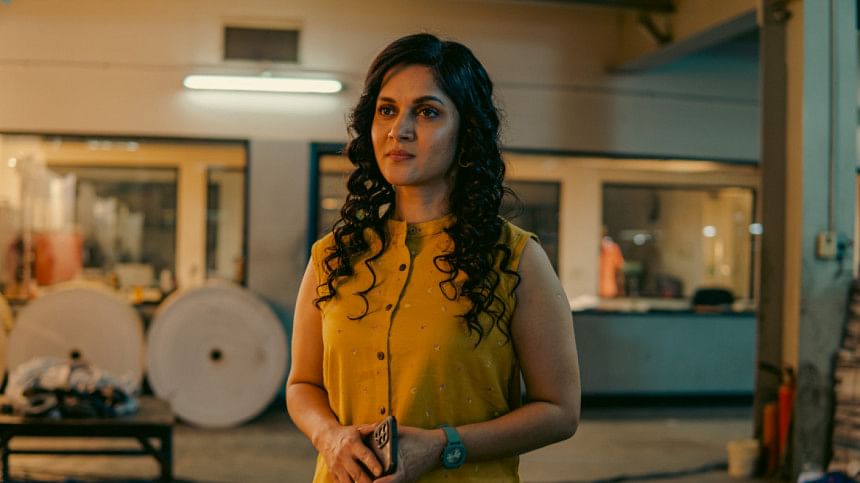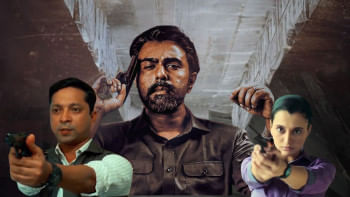‘Baaji’ delivers high-stakes drama in cricket’s shadow

In "Baaji", director Arifur Rahman crafts a narrative that unfolds against the backdrop of high-stakes drama and societal complexities, using the mysterious death of cricket star Apu as its pivot point.

One of the scenes shows police inspector Topu and his subordinate officer Faruk drinking together in a bar. Topu's life is murky, struggling to reconcile with the inevitable compromises of personal and family life. In the background, the solo of "Teka O Pakhi" plays, resonating with the subconscious minds of the audience. In its lyrics, the song reflects on how money comes easily in song, yet remains elusive in reality. We chase after it, trading our lives away or losing them in the pursuit of wealth; "Baaji" seems to serve as a solemn reminder of this familiar truth.
Released on the OTT platform Chorki during Eid-ul-Azha, the web-series has become one of the festive highlights with its seven episodes, starring the former celebrity couple Tahsan Khan and Rafiath Rashid Mithila.

Penned collaboratively by Aditya Sengupta and Hasanat, the plot unfolds with the mysterious death of rising cricket star Apu, who dies under suspicious circumstances after delivering a stellar performance as Man of the Match. Investigating his brother's death, Topu begins to unravel a series of enigmas, including rumours linking the country's biggest cricket star to the incident. As he delves deeper, Topu uncovers interconnections in the betting world, leading to a cascade of sensational revelations. The episodes are aptly titled with cricket terms: Powerplay, How's That, Decision Pending, Caught Behind, Inside Out, Strategic Timeout, and Death Over.

Though the narrative revolves around betting and its consequences, actual cricket scenes are minimal. Consequently, despite its unique framing, the story ultimately culminates in a conventional murder mystery.
Scriptwriter Hasanat endeavours to infuse the screenplay with subplots and dialogues that touch on family life, internal police biases, power dynamics, and the influence of 'editor's choice' in journalism. In some areas, Hasanat succeeds, and director Arifur Rahman adeptly executes the script. The dynamics between journalist Jinia and her editor, the relationship between senior cricketer Abir and junior Apu, Apu's egotistical equations with his brother, and the dichotomy of assassin Mrs 45's lethal and troubled family life are portrayed with a fine balance.

However, the depiction of betting as a mass-market phenomenon involving rickshaw pullers, students, and marginalised individuals is lacking. It seems to portray betting as an elite culture. Presenting betting in fiction while tournaments and TV channels promote betting sites raises questions about the director's intended social sphere or perspective for this portrayal. Topu's informal entry into an exclusive franchise's practice session, despite being a nobody in the team, serves as a pivotal subplot, yet it feels illogical, driving the story on a larger scale. The subplot of Tahsan and Mithila's relationship and their professional reunion with the dialogue– "we are professionals" – serves as a brilliant metaphor.
Dialogues like "Modh Kha, Manush Ho" and "Dhal Nai, Talwar Nai, Nidhiram Sardar"– blend effortlessly with the narrative. However, recurring tropes in our web-series, such as the infertility crisis in Topu and Renu's marriage and the tendency to depict police characters as personal, professional, or economic losers, require careful consideration for change by the directors. Nonetheless, a notable feature of this script is that every character is given equal space.
"Baaji" is a completely star-studded show, which also features Mim Mantasha, Nazia Haque Orsha, Shahadat Hossain, Partho Sheikh, Tasnuva Tisha, Abrar Athar, Azharul Hoque Adil, and Manoj Pramanik.

Nazia Haque Orsha undeniably deserves credit for her exceptional performance in the series. The character of Mrs 45 can single-handedly drive the show, thanks to the script. Besides this, Orsha herself stands out as she portrays a mother, the wife of a disabled man, a family's cornerstone, and a ruthless contract killer simultaneously.

Tahsan Khan makes his OTT debut with "Baaji". An experienced actor, Tahsan found the role of Abir relatively undemanding. Whether creating tension through his performance or navigating the strains of his character, Tahsan handled it comfortably. The professional ethics and the fear of a sudden fall, reminiscent of Satyajit Ray's "Nayak", are crucial here. However, Tahsan's portrayal of cricketer Abir lacks finesse as his grip on the bat, positioning, execution, and body movements were not convincing. Yet, Abir earns passing marks as Tahsan performed well in emotional scenes. Here, the director didn't spend much time on character development, and Tahsan managed the ups and downs without losing the narrative flow.

Manoj Pramanik's portrayal of Inspector Topu is noteworthy. Although the story's predictable outcome diminishes Topu's struggle somewhat–a hallmark of motion pictures that demands attention to every detail for effective storytelling, Pramanik excels as a brother and performs credibly as an ordinary police officer. However, his fight scenes lack conviction, and his batting scenes show poor execution, with his grip and positioning lacking credibility.

Rafiath Rashid Mithila plays a young journalist, Jinia, in the series. The character occasionally loses direction, with hurried efforts to maintain continuity within the storyline. Despite this, Mithila's performance is commendable, though her screen time is limited compared to others, despite being a major draw in the trailer and marketing strategy.
The series' cinematographer, Suman Sarker, known for his work in numerous notable Bangladeshi productions, brings his touch to "Baaji" with beautifully framed shots, such as the romantic moment between Topu and his wife seen through a bedroom door. Almost every indoor shot is captivating. However, the cinematography of the cricket broadcast does not meet the standards of notable OTT works. The cricket scenes were poorly executed, with a basic misunderstanding that live sports broadcasts cannot be framed in the usual cinematographic grammar.
Designed by Sayba Talukder, the series' sound mix was good, barring a few lip-sync issues. However, the illogical audibility of the franchise owner's voice inside the VIP gallery's glass and the abrupt music transitions before jump cuts were problematic. This issue lies mainly in the rough cut, but with proper BGM planning, it could have been avoided. The Foley was realistic, and the lapel sounds were noise-free, providing auditory comfort.
When it comes to editing, "Baaji" seems to falter as even the simple task of scoreline editing on screen was botched. MH Munna's over was incorrectly marked before and after its completion, and his bowling economy didn't change after a six. During the next over by a pacer, the scoreline again remained unchanged, with inaccuracies in the bowler's name and overcount. Rushed jump cuts resulted in a lack of fade-outs throughout the screen time. In a scene where police officer Mir Mokarram Hossain exits the frame, the clock shows 11:40, but in the subsequent conversation with Faruk, it shows 11:30; Such editorial lapses disappoint the audience.
Colourist Chinmoy Roy's work was exquisite, especially in scenes like Topu's mother wearing an abaya indoors. The influence of costumes on colour balance was noticeable. Edila Farid Turin managed the costumes well. The colourist ensured the police station's color scheme and Mrs 45's reddish gritty tone enhanced the mysterious vibe in all scenes. The emphasis on saree colour selection added a new dimension, proving how costumes can significantly influence character portrayal in fiction. The makeup work was also commendable.
Setting aside technical faults, "Baaji" narrates the story of a particular class in our society, a class integral to our societal structure. This class's proximity to power raises doubts about how much the general audience can relate. However, showcasing this class in fiction helps the general audience gradually understand their real position, marking the indirect success of productions like "Baaji".

 For all latest news, follow The Daily Star's Google News channel.
For all latest news, follow The Daily Star's Google News channel. 










Comments